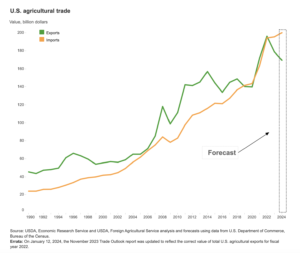President Donald Trump on Friday signed an executive order temporarily expanding the amount of beef the U.S. can import from Argentina, a move the White House says is aimed at…
Lawmakers Launch Ag Trade Caucus
“United States Representatives Jimmy Panetta (D-CA), Adrian Smith (R-NE), Jim Costa (D-CA), and Dusty Johnson (R-SD) announced the launch of the bipartisan Congressional Agricultural Trade Caucus” late last week, according to a press release from Panetta’s office.
The caucus, which had been in development since September 2023, will “advance and promote policies vital to U.S. agriculture, including boosting agricultural exports, facilitating food and agriculture trade, and knocking down unnecessary trade barriers,” the press release said.
Ag Trade Concerns
Concerns around a lack of agriculture trade deals for U.S. farmers have increased in recent years, especially as the agricultural trade deficit has ballooned since 2022 and is projected to reach “$27.5 billion in fiscal 2024, thanks to the unyielding American appetite for fresh produce, coffee, and wine, say government forecasters. More food and ag imports will flow into the United States at the same time that farm exports shrink, led by a decline in sales to China,” according to FERN’s Ag Insider.

“The combination of smaller exports and larger imports would widen the trade gap by 45% from this year’s (2023) largest-ever $19 billion deficit, said a quarterly USDA report,” FERN’s Ag Insider wrote. “Large agricultural trade deficits are expected to be common in the future, fueled by consumer demand for imported foods that grows far faster than exports.”
Agriculture exports to China have also been of increasing concern for U.S. farmers over the last few years, according to Successful Farming’s Chuck Abbott, who wrote in August 2023 that “China is a golden market and a potential pothole for U.S. food and ag exports, said 20 farm and agribusiness groups in a letter to presidential aspirants. The letter, delivered ahead of the first debate among Republican contenders on Wednesday, called for diversification of the export market, through new free-trade agreements, to avoid over reliance on China, which buys $1 of every $5 in farm exports.”
Over-reliance on China could become problematic sooner rather than later, FERN’s Ag Insider wrote, as “economic headwinds and lower feed consumption reduce China’s overall import demand, particularly for feed stuff and animal products. Soybeans account for the bulk of the year-over-year reduction as U.S. supplies face stiff competition from Brazil.”
“China’s preeminent position among export markets “leaves U.S. farmers vulnerable to global supply-chain shocks,” said the letter to presidential candidates,” Abbott wrote.
Reaction to the Caucus
Congressional Agricultural Trade Caucus co-chair Panetta said in the press release that the caucus was also founded, in part, because its members feel that “Congress needs to be more active in promoting trade agreements that will keep American producers competitive and empower them to feed the world. The bipartisan Agriculture Trade Caucus was founded to ensure the farmers and ranchers in our districts and throughout the country are prioritized in our nation’s overall trade agenda. Together, we are committed to ensuring new trade agreements are enforceable, high-standard deals that ensure fairness and expand new markets for the immense bounty our country produces.”
Iowa Republican Congresswoman Ashley Hinson told Brownfield Ag News that the caucus should help, especially as the Biden “administration has been slow to get moving on any trade deals. We need to be focused on expanding markets for American producers, and that is the way I think we can show China our eggs are not all in one basket with you. We have diversity in trade.”
American Farm Bureau President Zippy Duvall said in a press release that the “AFBF appreciates House lawmakers for coming together in a bipartisan manner to form an agriculture trade caucus. We have a real opportunity to showcase American agriculture on the global stage. Expanded trade agreements will help ensure America’s farmers and ranchers remain economically sustainable by providing access to new markets as they feed families around the world.”
During the development of the caucus, Rep. Adrian Smith said he hoped that it could also “provide assistance with current trade disputes like the Mexican ban on biotech corn,” according to Brownfield Ag News.
“The new bipartisan Congressional Agricultural Trade Caucus will work to solidify support for trade policies that benefit farmers, ranchers, producers, rural communities, and all those along our food and agricultural supply chains,” Panetta’s press release said. “The caucus will support education and engagement opportunities for members of Congress to promote policies which boost international competitiveness, increase market access, address non-tariff barriers to trade, improve supply chains, and reestablish U.S. global leadership on trade.”





